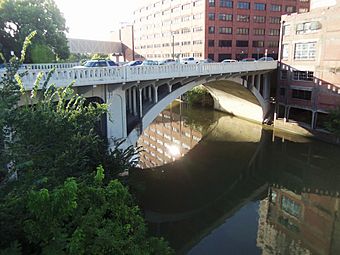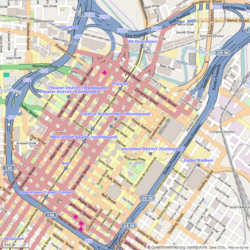San Jacinto Street Bridge over Buffalo Bayou facts for kids
Quick facts for kids |
|
|
San Jacinto Street Bridge
|
|

View from the south bank of Buffalo Bayou
|
|
| Location | San Jacinto and Willow streets, Houston, Texas |
|---|---|
| Area | less than one acre |
| Built | 1914 |
| Built by | William P. Carmichael Company |
| Architect | E. E. Sands |
| Architectural style | City Beautiful |
| MPS | Historic Bridges of Texas MPS |
| NRHP reference No. | 07001098 |
| Added to NRHP | October 2007 |
The San Jacinto Street Bridge is a special kind of bridge called a viaduct. It crosses over Buffalo Bayou in Houston, Texas. This bridge is so important that it's listed on the National Register of Historic Places (NRHP). It was built in 1914 to replace an older bridge from 1883. The bridge was also updated in 1997. It helps people travel between downtown Houston and the historic Fifth Ward.
A Look Back: History of the Bridge
The story of San Jacinto Street began when Houston was first founded. It was marked as a street way back in October 1836. Houston built its first bridge over Buffalo Bayou on San Jacinto Street in 1883. This bridge helped people get from the Fifth Ward to downtown. Many working-class families lived in the Fifth Ward.
At that time, Houston's main dock was still busy with ships. So, any bridge at San Jacinto Street needed to let ships pass. This first bridge was made of iron. It could swing open on a special stand on the north side of Buffalo Bayou. This allowed boats to go by.
Building the New Bridge in 1914
Houston decided to build a new bridge on San Jacinto Street in 1914. The area just north of downtown, the Fifth Ward, was growing fast. It was becoming an important industrial area. But Buffalo Bayou separated it from downtown.
The mayor at the time, Horace Baldwin Rice, really liked the "City Beautiful" idea. This was a movement that encouraged cities to be beautiful and well-designed. So, he wanted the new bridge to look good, not just be useful. The new bridge made it easier for river boats to pass underneath. It had a large "barrel arch ring" design. This design also made the bridge look nice and fit the City Beautiful ideas.
An engineer named E. E. Sands designed the bridge. He worked for the City of Houston. The William P. Carmichael Company built it. They used strong material called reinforced concrete for most of the bridge. This is concrete with steel bars inside to make it extra strong. People walking on the bridge could enjoy its fancy details. These included curved walls and railings with decorative urns.
The bridge has a design called an "open spandrel concrete arch." This was a popular style for bridges built during that time. In 2007, there were still 23 bridges like it in Texas! The San Jacinto Street Bridge is 325 feet long. It stands on twenty-foot-long poles called pilings. The road part of the bridge is 50 feet wide. On each side, there are sidewalks that stick out 10 feet.
Updating the Bridge in 1997
The San Jacinto Street Bridge was updated in 1997. The important parts of its design, like the open arch, were kept. The top part of the bridge, called the decking, was replaced with new reinforced concrete. The original railings had oval openings. These were replaced with new concrete railings that had rectangular openings.




